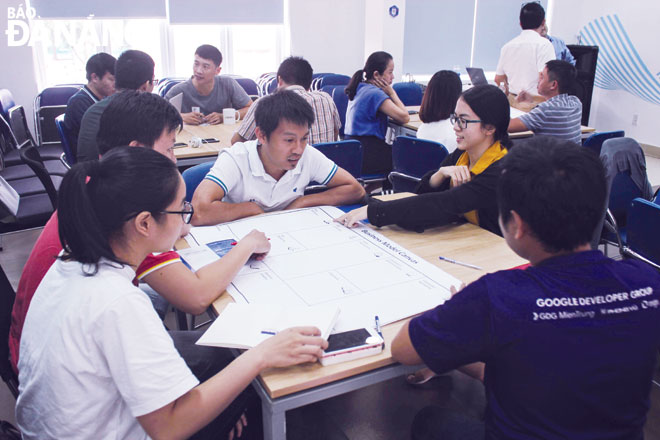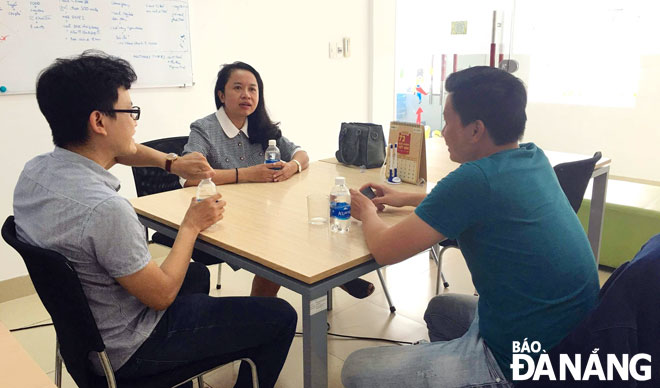Finding "midwives" for local startups
Developing start-up projects is very tough as numerous challenges, difficulties, and even repeated failures can become inevitable. If the government authorities give more active support to startups, the burden young entrepreneurs are shouldering can be considerably eased.
 |
| Mr Bui Ngoc Vinh, the founder of the Da Nang-based ST United Co., Ltd. (centre, in white) is pictured introducing business models to young startup developers |
According to the Da Nang Department of Science and Technology, over the past 3 years, about 60 startup projects have made their debut across the city, of which over 30 are still operating. Mr Ho Quang Dung, the Deputy Director of the Da Nang Entrepreneurship Support Company Ldt (DNES), also known as the Da Nang Incubator, confidently said, this figure would be even higher if young startups accessed seed capital.
In reality, such popular IT events in the city as Devfest and The Internet of Things (IoT)-Artificial Intelligence (AI) Hackathon (Hackathon) have seen many highly practical startup ideas. However, it is a pity that, as these events end, their participants cannot start building and planning the launch so as to get their startup off the ground due to the lack of investment funding.
This issue of deep concern is now facing Da Nang, and the country at large. The lack of institutional support is one of major factors behind the failure of many startups to take off and thrive. In reality, 80-90% of the startups fail in the early stages because they don’t have enough funding to move on to the expansion stage. Funding for startups mostly comes from venture capital funds, businesses and angel investors, not from the government.
Ms Thach Le Anh, the co-founder of the Viet Nam Silicon Valley Accelerator, pointed out to the fact that Viet Nam’s capital market is still small. According to Mr Pham Bac Binh, the Chairman of the city’s Small and Medium-sized Enterprises (SMEs) Association, most SMEs operating in the city still have to rely on bank loans to maintain their production activities. Therefore, it is rare to see them invest in startups. Still worse, there is no protection policy issued by the national government for investors who want to provide financial backing for startups.
 |
| A businesswoman is seen serving as a mentor to provide valuable startup-related knowledge and advices for startup developers. |
There are 3 periods in the development of a startup - discovery, validation and expansion. It is in the first 2 periods that startups need funding the most. In other countries worldwide like Singapore, the government offers a variety of grants that can support up to 70% of a company’s costs.
Mr Dam Quang Tuan, the Chairman of the Board of Directors of the Duc Manh Corporation, urged the municipal government to act as a “midwife” for startups.
Accordingly, it is a good idea to create funds, stimulate private capital investment and mobilise more social resources so as to support startup entrepreneurs. Besides, the building of information channels about startups which allow businesses to learn more about capital contribution opportunities is also highly recommended.
In fact, when a business has overcome the difficult period, it will no longer be dependent on the government’s capital and can source investment from other private companies.
Another important factor is to promote the role of mentors who have a deep insight into what troubles newly-established startup founders most and then help them go through challenges, thereby validating their business ideas. Moreover, mentors can recommend investors to select highly potential startup projects for financial backing, thereby actively reducing risks when investing in startups.
Mr Cao Tri Dung, the Chairman of the municipal Travel Association, said more and more tourism businesses are seeking ways to boost bilateral cooperation with startups. In the past, most of the tourists arrived in the city through their bookings via travel agencies, but now, 70% of the holidaymakers like travel on their own through the use of travel apps to book flights and accommodation. Therefore, it is now high time for travel agencies to change their operating orientation and connect with startups, especially those involved in the tourism sector, for mutual development.
Many of the more than 2,000 business members of the Association are now ready to support startups in determining unmet customer needs and developing their proper products. In addition, the Association will act as a test market to gauge the viability of products or services developed by local startups in the market mass before to a wide scale roll-out.